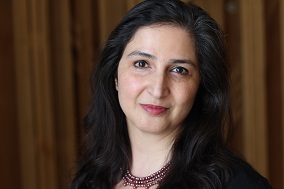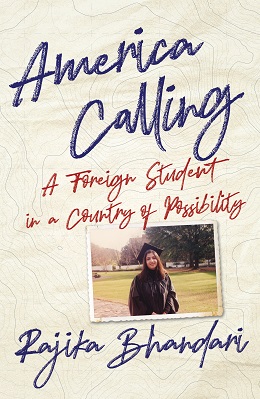Leaving Home, Finding a Voice: Young Women Crossing Borders
 By Rajika Bhandari
By Rajika Bhandari
I got to know Sherry Duan as a student in a class I was teaching at Columbia University in New York City. Part of a Chinese generation that even from afar was immersed in American pop culture and lifestyle, Sherry decided early on that she would study in the U.S. after high school. Some years later, when I tracked Sherry down in China to interview her for my book, I asked her what the greatest impact of studying in America had been for her.
To my surprise, she didn’t mention academic attainment or procuring jobs in China because of her foreign degree. Instead, the most profound impact was how the experience shaped her personality. Growing up in China, Sherry was not outspoken and had few strong female role models. But after coming to the U.S., where she saw women in leadership roles, she began to seek out role models that inspired her.
Thousands of women leave their homes and their countries each year to study in the U.S.—477,000 were studying the U.S. at last count (and before the pandemic disrupted travel). For them it is a journey that is not just about the college degrees attained, but is an education of the mind, shaping young women into the individuals they will eventually become.
This had been my path as an international student to the U.S. from India, but as I began to interview international students for my book, I realized that my experience reflected that of thousands of other women for whom crossing borders is deeply transformative, a coming-of-age through which they learned to walk straighter, to speak louder, and to think for themselves.
As far back as 1915, exactly 80 years before I acquired my master’s degree from an American university, a Miss. K. Tullaskar who had received an M.A. from the University of Chicago, wrote a paper in the Hindusthanee Journal titled Why Should Hindu Girls Go to America. She argued that all young Indian women needed to study in the U.S. in order to broaden their minds.
Around the same time, in 1917, Levi Lewis Barbour, a regent at the University of Michigan, was inspired by his experience with Kameyo Sadakata, “a tiny and timid Japanese schoolgirl who arrived at the university to study medicine” to set up the Barbour Scholarship for Oriental Women which would provide enable women from male-dominated cultures to study abroad.
And more recently, the King Abdullah Scholarship Program that was launched in 2005 and over the next decade sent thousands of young Saudis—including many women—to study in the U.S. to foster mutual understanding between the U.S. and Saudi Arabia, has had a profound impact on the current generation of young Saudi women.
Reflecting on these stories, I wondered what it was about the experience of leaving home and studying abroad that was fundamentally life-altering? Sherry told me that after finishing her studies in the U.S. she wanted to try something completely different and saw on the internet that Ivanka Trump’s fashion label (which no longer exists) was looking for an intern.
She decided on a whim to reach out to Ms. Trump on LinkedIn, expressing interest in interning for her. To her surprise, she heard back. The experience gave Sherry the confidence that she could try anything: “It made me audacious. If Ivanka Trump could respond to me, I felt I could do anything that I wanted.”
I heard this idea repeated often: that being in a new country and context stretched young women beyond their comfort zones, exposing them to new possibilities about themselves and the world. Even though the Saudi women students in the U.S. were accompanied by male chaperones, they nonetheless had to fend for themselves, becoming self-reliant and problem-solving in ways that they were never required to or permitted to before.
They learned to drive when it was still illegal for women to drive in Saudi Arabia; they obtained personalized licensed plates, a small but symbolic act of freedom. Upon returning home, their new-found confidence led them to challenge the status quo, to make their opinions heard, even turning down marriage proposals that would have detracted from fruitful careers.
But these women have evolved in their thinking and beliefs not only because of their exposure to more liberal Western ideas, but also because the act of leaving home is inherently transformational and eye-opening, especially for women. Having spent over 25 years of my life moving between America and India, I know there is no perfect country for women.
But what I know is that America has shaped my understanding of what I can be both as an individual and as a woman. It has opened my eyes to the contradictions and inequities with which women live and the overt and hidden sexism that surrounds us—a reality that exists in both America and India. I have learned that even in the U.S. the obvious and visible choices women enjoy—the freedom of movement, the freedom of dress, the freedom of speech—are often external and at times superficial obscuring some of the bigger issues, whether it is the low representation of women in C-suites and leadership roles, the gender wage gap, or the prevalence of sexual assault.
Ultimately, we have to leave home to understand the shortcomings and contradictions of our countries and where we come from. Becoming an outsider but with the experiences of an insider allows us both to learn about the unfamiliar and to look at the familiar with a fresh perspective. It is as if we are seeing our city and country from high above, each nook and cranny exposed as never before.
—
BIO:
A former international student from India to the US and an Indian American immigrant, Rajika Bhandari is an international higher education expert, a widely published author, and a sought-after speaker on issues of international education, skilled immigrants, and educational and cultural diplomacy. An author of five academic books and one previous nonfiction book, Dr. Bhandari is quoted frequently in the global press, and her writing has appeared in the Guardian, the Chronicle of Higher Education, HuffPost, University World News, Times Higher Education, and the Diplomatic Courier, among others. She lives outside New York City.
AUTHOR WEBSITE, SOCIAL MEDIA HANDLES:
Author website: www.rajikabhandari.com
Facebook: www.facebook.com/rajika.bhandari
Twitter: @rajikabhandari
LinkedIn: www.linkedin.com/in/rajikabhandari
Instagram: @rajika_bhandari
America Calling: A Foreign Student in a Country of Possibility
 Growing up in middle-class India, Rajika Bhandari has seen generations of her family look westward, where an American education means status and success. But she resists the lure of America because those who left never return; they all become flies trapped in honey in a land of opportunity. As a young woman, however, she finds herself heading to a US university to study, following her heart and a relationship.
Growing up in middle-class India, Rajika Bhandari has seen generations of her family look westward, where an American education means status and success. But she resists the lure of America because those who left never return; they all become flies trapped in honey in a land of opportunity. As a young woman, however, she finds herself heading to a US university to study, following her heart and a relationship.
When that relationship ends and she fails in her attempt to move back to India as a foreign-educated woman, she returns to the US and finds herself in a job where the personal is political and professional: she is immersed in the lives of international students who come to America from over 200 countries, the universities that attract them, and the tangled web of immigration that a student must navigate.
An unflinching and insightful narrative that explores the global appeal of a Made in America education that is a bridge to America’s successful past and to its future, America Calling is both a deeply personal story of Bhandari’s search for her place and voice, and an incisive analysis of America’s relationship with the rest of the world through the most powerful tool of diplomacy: education. At a time of growing nationalism, a turning inward, and fear of the “other,” America Calling is ultimately a call to action to keep America’s borders and minds open.
Buy here.
Category: Contemporary Women Writers, On Writing
























